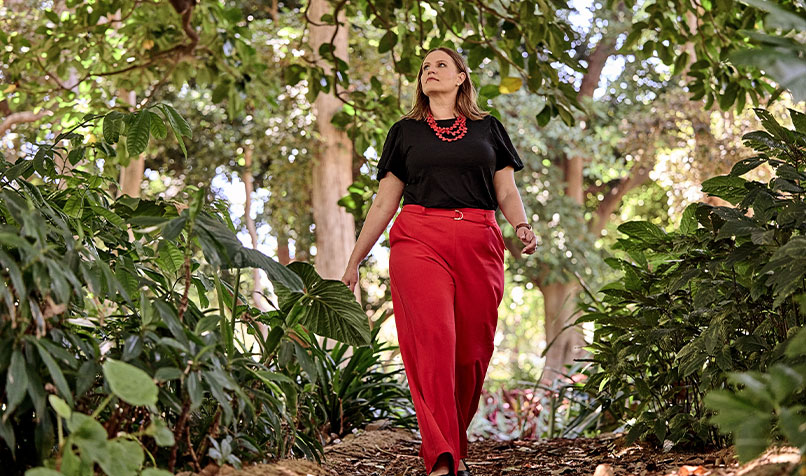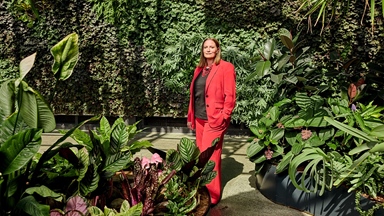Loading component...
At a glance
- Gabrielle Collins FCPA is CFO of the Botanic Gardens of Sydney, which cares for four community spaces.
- Collins has all four sites under her purview and oversight over a range of multi-function teams.
- She highlights the importance of diverse experiences and going outside of the remit of the CFO role.
The role: many branches
This is my first CFO role and it’s undoubtedly very different from the other senior executive roles I’ve held in the public sector.
The role has oversight over multi-function teams, including finance, IT, cyber, HR, internal audit, risk, corporate services, governance and commercial property leases.
I’ve worked in strategy and planning, corporate services and procurement. That said, the CFO role at the Botanic Gardens of Sydney is the broadest role I’ve ever taken on.
While finance is the focus, it is the variety that attracted me to the job — not to mention working for an organisation as iconic as the Botanic Gardens. It’s very much aligned with my love for nature and the outdoors.
No two days are the same. The breadth of matters that come across my desk never ceases to amaze me. It is not just the Royal Botanic Garden and The Domain in Sydney that come under our purview, but also the Australian Botanic Garden Mount Annan (in Sydney’s south-west), and the Blue Mountains Botanic Garden Mount Tomah (in the Blue Mountains).
Across all sites, we’re overseeing more than 700 hectares of land, which together attract more than 13 million visits per year.
"As a NSW government agency, we serve the citizens of NSW, and the public expect a certain standard from the Gardens and their visitor experience. We must always demonstrate the value-for-money that we’re deriving from every dollar we spend."
One moment I could be engaged in strategic matters, and the next I'm reacting to emerging issues. My daily tasks could include everything from high-level meetings and negotiations to reviewing briefing notes and accounting papers or having discussions with the New South Wales (NSW) Treasury about funding.
Often, I could be liaising with colleagues from external agencies or looking at operational matters on the ground in the Gardens.
As a NSW government agency, we serve the citizens of NSW, and the public expect a certain standard from the Gardens and their visitor experience. We must always demonstrate the value-for-money that we’re deriving from every dollar we spend.
Maintaining our significant Living Collections, running our scientific programs and providing unique visitor experiences takes up the majority of the budget.
There is always a need to increase existing revenue streams and to diversify revenue sources. Hosting a program of flagship events at The Domain is one way we try to achieve this — generating vital revenue by welcoming globally renowned artists and large crowds for public concerts.
My role also carries oversight of commercial tenders, which is another area where we’re working to improve opportunities for sustainable revenue.
This might include seeking out new opportunities to enhance the visitor experience, for example, with new food and beverage operators. This revenue in turn funds the critical work of the Gardens in botanical research, science, conservation and education, as we seek to fulfill our mission.
Game changers: diverse experiences
If there was one big game changer for me, it was the move from commercial practice early in my career to the public sector.
The Australian Public Service offers opportunities and diverse experiences.
As I stepped out of the finance bubble, it ignited what I call my “mission focus”.
I’ve worked in communications, procurement, strategic planning and reform, none of which have had a “straight finance” focus.
In my previous role working at the NSW National Parks and Wildlife Service, I even got to train and work as a bush firefighter!
It is those moments which have been just as important to me. I was able to better understand how things work because I was outside the actual remit of the role. You need to think about what resonates and go after that. Go for the organisation you want to work for, not the role itself.
I really feel as though the diversity of those experiences has shaped me into the CFO that I am today.
Strategy Planning and Execution
My challenges: maximising funding

There is always the challenge of financial stability, and it can be difficult prioritising across a multitude of areas that come under the purview of the Botanic Gardens. At a broader level, the NSW Government also needs to carefully balance the available funding across so many critical priorities.
We have to think about where we sit as an organisation in that context and position ourselves to be in the mix for funding opportunities that we feel are important and aligned with NSW Government objectives.
Our needs have to be weighed up in balance with the rest of the NSW public sector. And of course, we’re living in a fiscally constrained environment at the moment, with cost-of-living pressures mounting.
Amid this, we maintain the ongoing financial stability of the Gardens to make sure that our important scientific, education and conservation work can continue long into the future. We have to keep the discussions going with stakeholders and always ask ourselves what we can do to maximise the funding we have and keep balancing our priorities, moving forward and improving our outcomes.
Lessons learned
- Lead with your values: Create a supportive, kind and inclusive workplace. That way, you’ll achieve success in business and support the long-term growth and wellbeing of the heart of the organisation — its people.
- Be a catalyst for change: Don’t be afraid to be daring. Drive forward to enhance performance and make positive, impactful change.
- Test and adjust: Anticipate the needs of stakeholders, but don’t operate on assumptions — test thinking and adjust course when you need to.
- Never take things personally: In leadership, you’ll face criticism and many tough decisions. The earlier you develop emotional resilience in your career, the better. Professional feedback is golden — reflect on it often in your leadership practice.

